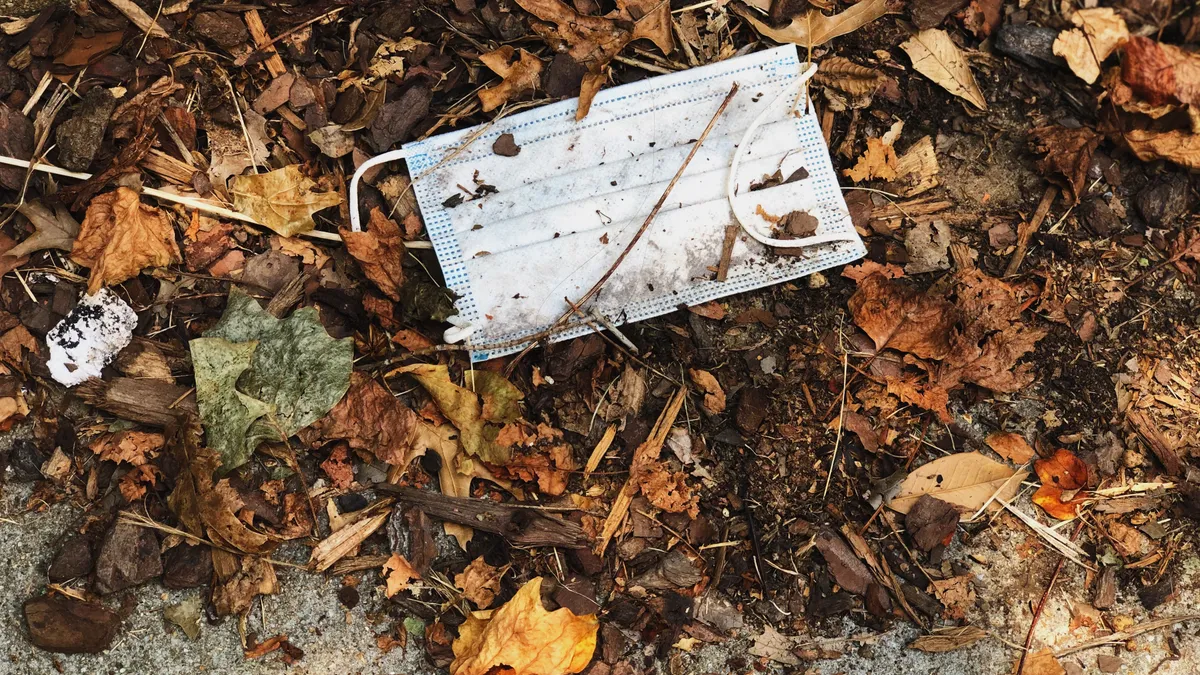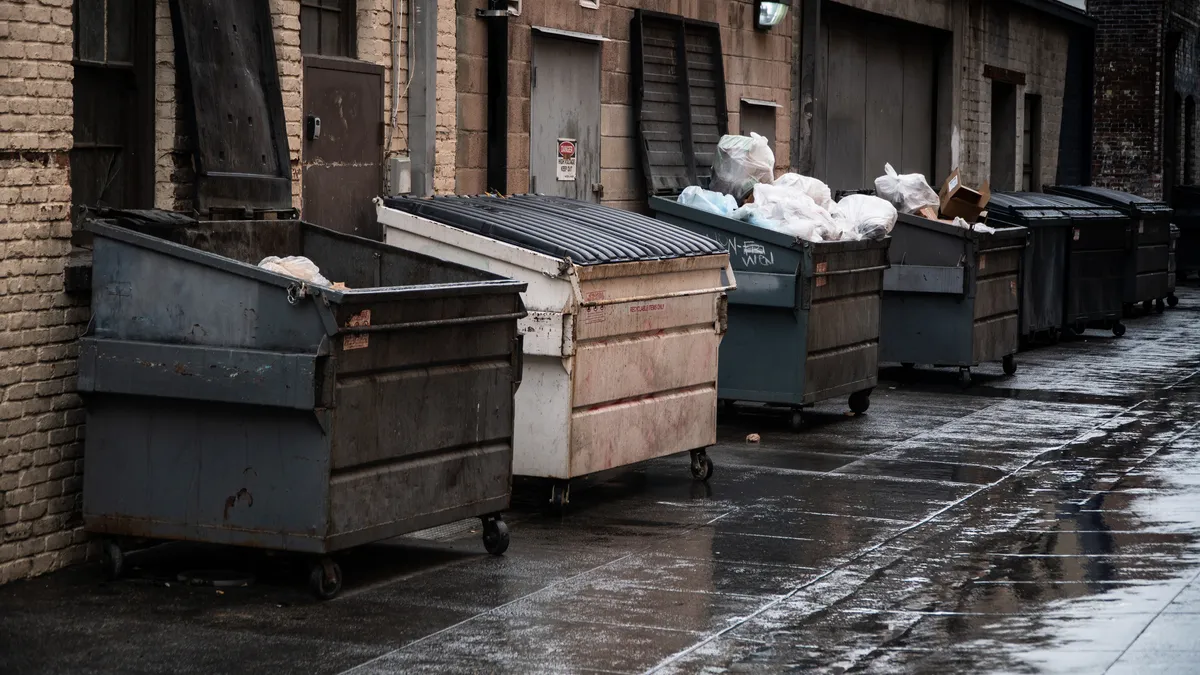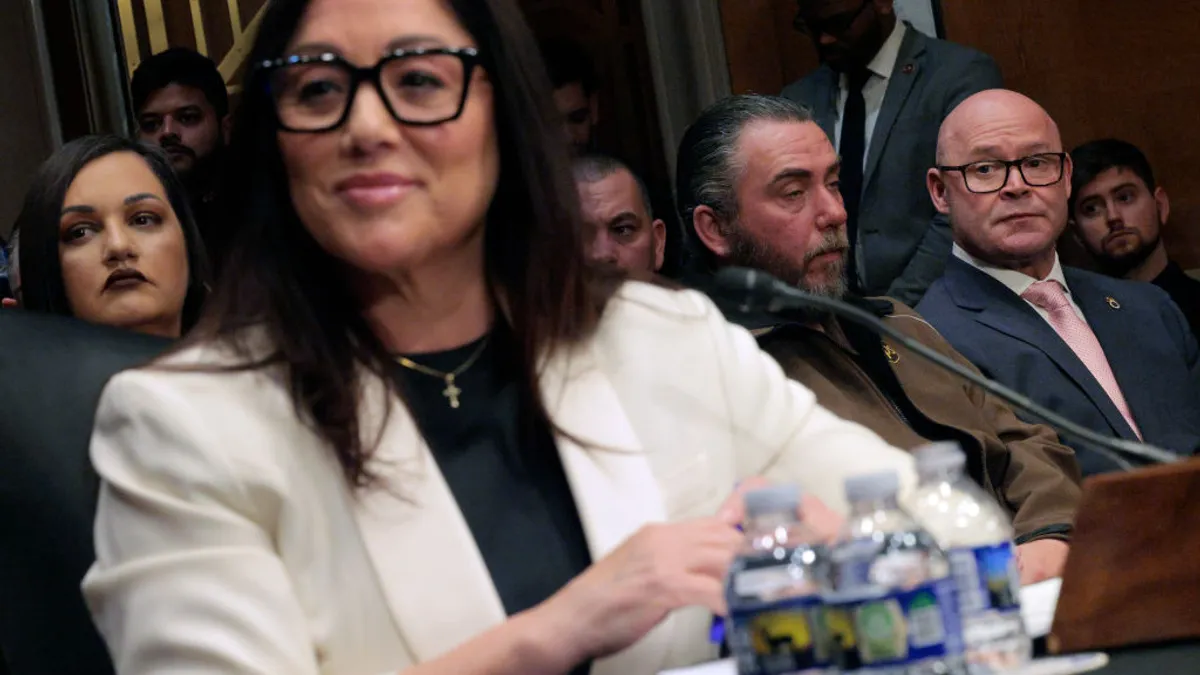Editor's note: Back in January, Waste Dive laid out seven pressing questions to guide its work in 2020. Major events have since upended all expectations. Now, more than halfway through the year, we're taking a moment to reflect on where things stand with those issues and update the list to include one more.
What do you think? As always, we're happy to hear any feedback at waste.dive.editors@industrydive.com.
What will it take for industry service providers of all sizes and ownerships to make their workplaces as safe as possible?
The industry's record in terms of reported crashes and fatalities was off to a mixed start this year, but efforts to improve workplace safety drew heightened attention as the COVID-19 pandemic began. While anecdotal reports indicate there was a short-term decline in vehicular incidents during the initial months of lockdown — attributed in part to less traffic — operators of all sizes have faced questions around protecting workers from the virus. The measures taken required new investments in personal protective equipment (PPE), cleaning procedures, logistical changes in MRFs or truck cabs and more.
While it initially appeared the majority of industry operators — outside of areas like New York — avoided the worst of COVID-19, recent spikes around the country have affected a new round of workers. The urgency behind this issue has prompted an emphasis on communication, training, paid leave provisions and PPE access that could potentially help with pre-existing occupational safety hazards as well, but whether employers can meaningfully improve safety metrics this year remains an open question.
Will record earnings and heightened M&A activity peak in 2020?
Many major companies reported they were on track for record starts to the year before the pandemic hit, posting positive Q1 results even as all experienced financial effects from the pandemic's onset. Upcoming Q2 results will be more telling, but multiple companies said they are seeing an upswing. The coronavirus continues to affect workforces and attempts at economic recovery in unpredictable ways, but so far it appears the industry's largest players will emerge solidly.
What this means for smaller service providers, many of whom applied for federal relief funding, may differ case-by-case. Based on Waste Dive's analysis of federal data, nearly 4,000 entities took advantage of the Paycheck Protection Program (PPP) for at least $583 million in relief funding, as of June 30.
While the pandemic delayed some acquisitions in progress, and temporarily slowed due diligence for future possibilities, the active deal environment is projected to continue. The blockbuster Waste Management-Advanced Disposal Services acquisition is plugging along, with a major divestiture package slated for GFL Environmental. Plenty of other transactions were completed or announced so far this year. Multiple companies have hinted at more to come, with some analysts predicting the upcoming election cycle could be a motivating factor.
Will lofty sustainability goals bring fundamental changes to how waste and recycling companies do business?
The pandemic has been temporarily disruptive to some sustainability efforts, but it has not stopped multiple companies from setting, or pledging to set, new emissions reduction targets. As for tangible changes among players of various sizes, there have been signs of movement in the form of purchasing more electric collection vehicles, making investments in recycling infrastructure and continuing to adapt to regulatory requirements in states such as California.
Conversely, plummeting oil prices have challenged the commodity values of plastic and led to some concern over whether CPG companies will remain committed to recycled content targets if the cost gap widens. These pressures, along with a general near-term tightening of capital budgets among service providers and local governments, could mean 2020 is not going to be a year of substantial progress on sustainability targets. Ongoing discussions within the industry and financial sector indicates it could be a foundational one, however, and foreshadow how this topic may become more mainstream.
What will upcoming elections mean for industry regulation, as candidates propose increasingly bold environmental platforms?
Former Vice President Joe Biden's emergence as the presumptive Democratic nominee for president holds plenty of uncertainty for the industry, particularly around potential changes in tax policy. While he has yet to announce specific plans on waste and recycling issues, Biden’s campaign has drawn repeated contrasts with President Donald Trump — who has overseen a largely deregulatory agenda focused on market-based solutions that could be expected to continue in a second term.
Experts agree a Biden administration would place far more of a focus on climate change and environmental justice, potentially resulting in further regulations that could hit methane and other emissions. A climate action plan released in late June by House Democrats has been viewed as a potential preview of how a Biden administration might be supportive of extended producer responsibility (EPR) policies. The Democratic National Committee's draft platform also includes a pledge to support "communities and businesses nationwide in their efforts to build zero-waste and circular economies, including efforts to eliminate plastic waste and food waste."
Down ticket races could also prove significant if, for example, Democrats retake the Senate. Some in the industry anticipate that could lead to the acceleration of waste-related legislation endorsed by the climate action plan and Green New Deal-style policies, which could have broad, long-term implications for the industry.
Will an influx of federal and state recycling legislation pave the way for expansive change or incremental movement?
While the pandemic has disrupted activity in many state legislative sessions, national waste and recycling legislation continues to gain attention. The Democratic climate action plan released this summer recommends passing the Break Free From Plastic Pollution Act and Zero Waste Act. Through the blueprint, Democrats have seemingly thrown their weight behind EPR laws, along with proposals for a national container deposit system and bans on certain plastic products.
Divisions on the issue of plastics specifically have grown increasingly partisan, even as members of both parties have continued to hold hearings on recycling. There remains deeper bipartisan support for legislation like the RECOVER Act and the RECYCLE Act, as well as Save Our Seas 2.0. Given the current legislative attention on the pandemic and other major issues, industry stakeholders consider it unlikely any major action on this issue will occur at the state or federal level ahead of November. But more bipartisan federal proposals, and proposals in states with less divided legislatures, could potentially have a stronger chance of passage heading into 2021.
And even if recycling legislation shows little movement this year, notable companies appear to be shifting on issues that could come under future regulation. In April, following negotiations around a broader shareholder resolution, Waste Management clarified its EPR position in a way that shows more potential flexibility. The company now says "EPR that recognizes and uses existing infrastructure investments while maintaining local control and contracts/franchises for recycling collection/processing may be worth considering as a funding option for sustainable recycling."
How can organics processing gain greater recognition as a viable business venture?
While the growth of organics processing infrastructure has traditionally been more active in states or regions with regulatory drivers, 2020 has seen ongoing investment in new projects. Sizable companies forecast more to come. ESG-driven investors are showing clear interest in the space in ways less common even a few years ago. The usefulness of this infrastructure also gained new attention when an initial period of lockdowns generated excess organic waste from businesses, entertainment and institutional settings. In many cases, digesters and compost facilities were ready to ensure it was managed beneficially.
Organic waste reduction and processing policies were also part of the House Democrats' recent climate plan. Multiple bills relating to the sector remain in play at the federal level, with ongoing interest in several states as well. While all of this is considered positive momentum for those in the organics sector, the pressure of cheap tip fees in certain regions still remains a near-term barrier to a wider shift away from disposal.
What will growing concerns about per- and polyfluoroalkyl substances (PFAS) mean for landfill and incinerator operators?
Industry concerns about PFAS have grown throughout the year. The chemicals remain a leading topic at conferences and webinars, with a mounting focus on research and solution strategies. Incinerators are facing increased scrutiny after chemicals were found near a facility in Cohoes, New York. Meanwhile, landfill operators are worried a growing emphasis on PFAS discharge may impact the sector, especially as wastewater treatment plants that accept leachate come under fire by the public and lawmakers.
Despite pressure, the U.S. EPA has yet to issue a maximum contaminant level for any PFAS, including PFOS and PFOA. But states are moving more quickly and community pressure is on the rise. Waste industry stakeholders are increasingly united in their efforts to communicate that their sites should not be held responsible for any contamination. Even so, legislation targeting the incineration of PFAS has been introduced in Congress, and some states are cracking down on the practice. More bills and further scrutiny is likely in this space, which remains among the most controversial emerging topics for the industry.
Will recent industry commitments to addressing systemic racism result in tangible changes for frontline workers, or more diversity in leadership roles?
The police killing of George Floyd and subsequent events have sparked a new level of attention to racism in the country and all industries. Back in June, leaders from some of the waste industry's largest companies, public sector agencies and other groups committed to having conversations within their organizations and paying closer attention to racism and systemic injustices. For some, this builds on existing pledges to make their workforces more diverse and inclusive.
At the same time, some workers and labor groups say their calls for hazard pay or additional coronavirus protections — which have not all been acted upon — are inextricably linked to racial issues. Renewed interest in environmental justice policies, which industry stakeholders support in theory but not always in practice, will also remain an ongoing issue. Efforts to promote more diverse leadership and ownership within some of the industry's largest companies are similarly still evolving. Whether this summer's new attention around such issues results in direct changes for the United States, or its waste and recycling industry, is an open question.






















